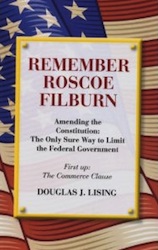I recently read the book “Remember Roscoe Filburn,” by Douglas J. Lising. I felt that there was a bit of a bait and switch going on but in reality, I guess I just wasn’t paying enough attention. The premise of the book is to revise the Commerce Clause and the basis for Lising’s argument was in 1941, the Commerce Clause was used to force a small Ohio wheat farmer named Roscoe Filburn to burn his crops.
 As the story goes, during this time, the federal government was regulating wheat farming under the Agricultural Adjustment Act of 1938. The purpose of the Act was to regulate wheat prices by setting quotas on the amounts of wheat produced by farmers. Filburn’s allotment was established at 11.1 acres at a yield of 20.1 bushels per acre (my, hasn’t the industry come along way in production). Despite being told of his allotment, Filburn plated 23 acres and thus harvested 239 bushels of wheat in excess of his allotment. As a result, the government ordered Filburn to destroy his entire crop and pay a fine.
As the story goes, during this time, the federal government was regulating wheat farming under the Agricultural Adjustment Act of 1938. The purpose of the Act was to regulate wheat prices by setting quotas on the amounts of wheat produced by farmers. Filburn’s allotment was established at 11.1 acres at a yield of 20.1 bushels per acre (my, hasn’t the industry come along way in production). Despite being told of his allotment, Filburn plated 23 acres and thus harvested 239 bushels of wheat in excess of his allotment. As a result, the government ordered Filburn to destroy his entire crop and pay a fine.
The long and short of it was the federal government argued that under the Commerce Clause, Congress has the power to regulate interstate commerce, and agricultural production fell under interstate commerce. Filburn argued that his wheat production did not fall under interstate commerce because it never entered the national marketplace because it the wheat was grown for his personal use. Ultimately, Filburn lost his case.
Lising argues that this is a gross overstepping of the federal government, who today uses this clause to regulate farm and crop subsidies, utility pricing to environmental control and regulations. He says that we need to take back control from the government, and the first step is to propose and ratify a new amendment, the Twenty-eighth Amendment to the Constitution of the United States. This amendment, he writes, will curtail the power of the federal government and strengthen the independence of the states.
While I agree that the government seems to be a disaster these days (just look at the past two years where they have literally been unable to “balance the budget”) I don’t agree with Lising’s proposed Twenty-eighth Amendment. While he admits he is no scholar, he says his goal is to create a dialogue and awareness regarding the government’s overreach of power, and this he does. However, all in all, I don’t recommend this book unless you are willing to take a similar radical stance to Lising.

